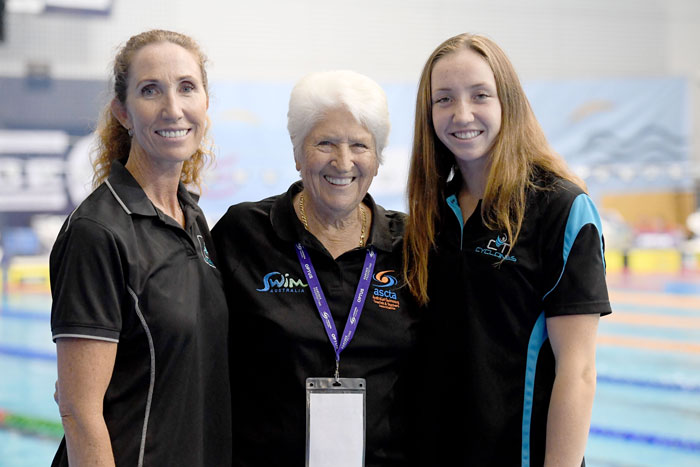14 December 2020
Olympic swimmer Janelle Pallister has ambition to go to another Olympic Games, but next time as coach of teenage daughter and Australian record holder Lani.
Pallister (nee Elford) is one of 40 coaches across 35 sports who has just completed a unique 26-week online coaching development course run by the Australian Institute of Sport (AIS) and La Trobe University.
The inaugural AIS Elevate e-Coach program was developed and conducted to overcome COVID restrictions, working exclusively with pathway coaches who are mentoring emerging athletes. The course included the likes of Olympic gold medal canoeist Ken Wallace, who is also embarking on coaching after an athlete career that netted six world championship titles.
A 1988 Olympic swimmer and 1990 Commonwealth Games gold medallist, Pallister worked as a flight attendant after finishing her swimming career. Her coaching career began by accident when she filled in as an instructor for her two toddlers at learn-to-swim classes.
Lani, 18, is now a world junior champion and the 800m and 1500m Australian short-course record holder in contention for her first Olympic team in Tokyo next year. Mum Janelle, will progress her coaching career in the new year by relocating from the Sunshine Coast to join one of Australian swimming’s most successful squads, run by head coach Michael Bohl at Gold Coast’s Griffith University.
“I had no ambitions to be a coach, but from a tiny speck of sand it kept getting bigger and bigger,” Janelle says. “It’s been evolving ever since and now I’ve been offered a job to work with Michael.
“I’ve developed myself to a certain level, but I need to expose myself to the next level and that’s a leap of faith. I’ve always said to my athletes ‘what do you lose by having a go?’. I need to take my own advice.”
“If I can develop myself and my athletes that we can both make Olympic teams, that’d be awesome.
“I do believe Lani will be an Olympian one day, whether that’s next year or in three years [in Paris 2024]. But she’s got to continue to love it and get the best out of herself. It would be an amazing story.”
Janelle credits the AIS coaching program for broadening her horizons as a coach and giving her the confidence to progress.
“All the coaching courses I’ve previously done have been with swimming coaches, which is great but sometimes you can put blinkers on,” Janelle says. “But when you do a course like this that involves all sports and coaches from all around Australia, you share different experiences and coaching philosophies.
“It has sparked so many different ideas for me and I feel more confident in my coaching. In the past I may have pigeon-holed myself and not taken that opportunity to learn from other coaches, now my ears prick up when I hear coaches speak from different sports.”
In the final session before the AIS course ended Janelle was partnered in a breakout group with taekwondo coach Sadhbh Sweeney.
“We were having a chat and realised we both coached our own daughters to an international level. It was good to discuss what we go through, wearing the coach hat and the mum hat.
“Throughout the years it’s had its challenges for Lani and I, two very strong-headed women. So we developed a strategy that as soon as we walk through the pool gate, Lani was the athlete and I was the coach. Then when we walked through the gate to go home, Lani was the daughter and I was the mum. To this day we still only speak about swimming at home if Lani brings it up.
“As a coach I’ve slowly developed her along, there’s no point being a champion at 10. You get to the top of the mountain with little steps along the way, you risk running out of puff if you’re taking big steps early on. Every year we’ve added another tool to the tool-belt and I believe there’s still more development in her to be better.
“As a mum, I’m just extremely proud. I always tell her ‘swimming is what you do, not who you are’.”
The AIS has recently launched the National High Performance Coach Development Taskforce, aimed at making Australia the world leader in modern high performance coaching development before the end of the decade.
Addressing the under-representation of female coaches in sport is one of the aims.
“Coaching is a hard world, it’s a very male dominated field and I think it’s also an occupation where society pigeon-holes people. It is hard, I’m not going to lie, but if you’re true to your convictions and have your philosophies and produce results that speaks a thousand words.”
The AIS will deliver a two-day conference for pathways coaches and practitioners on December 15-16, part of its commitment to help sports identify and develop Australia’s talented athletes of the future.

Photo by Delly Carr, Swimming Australia